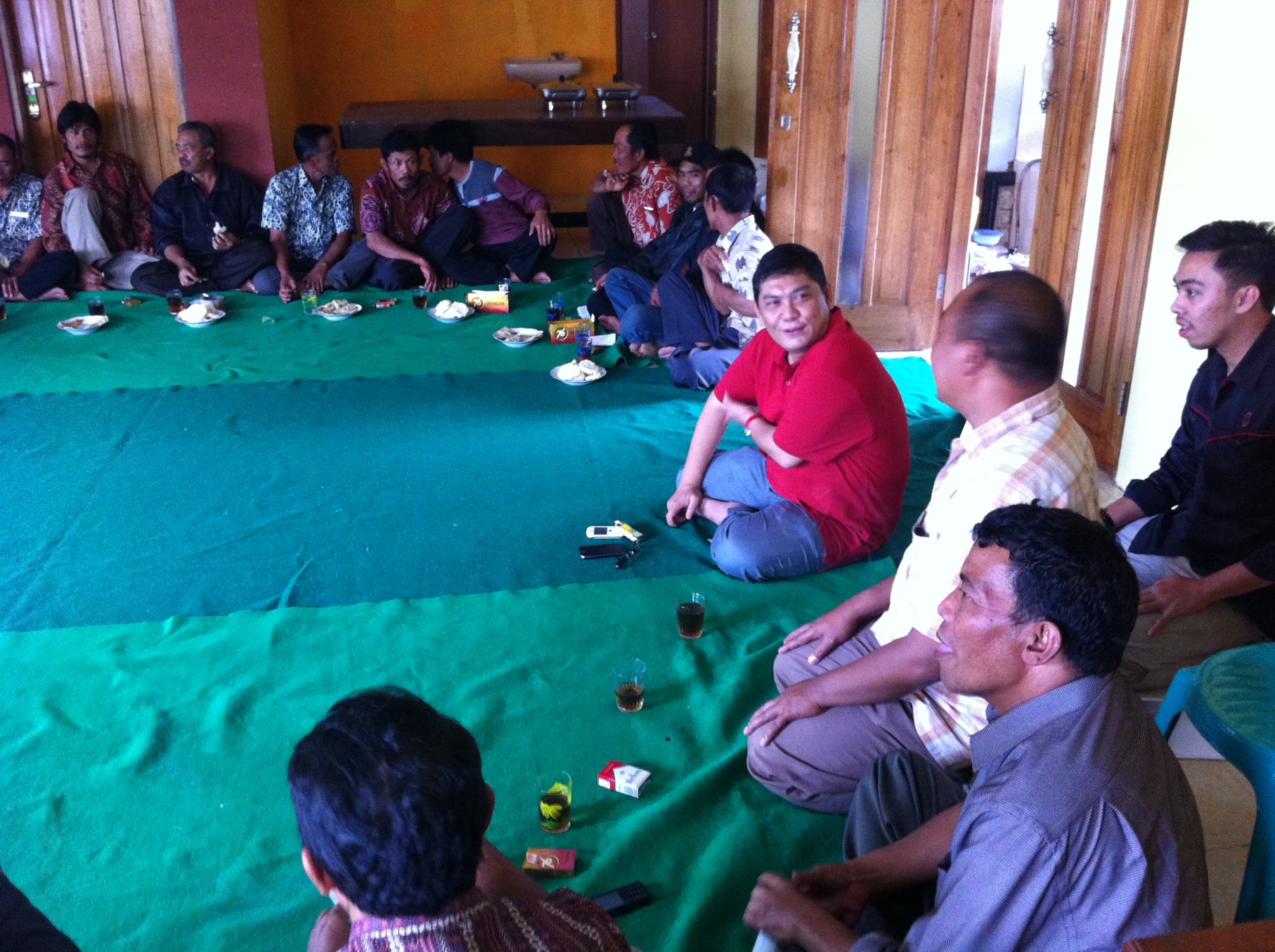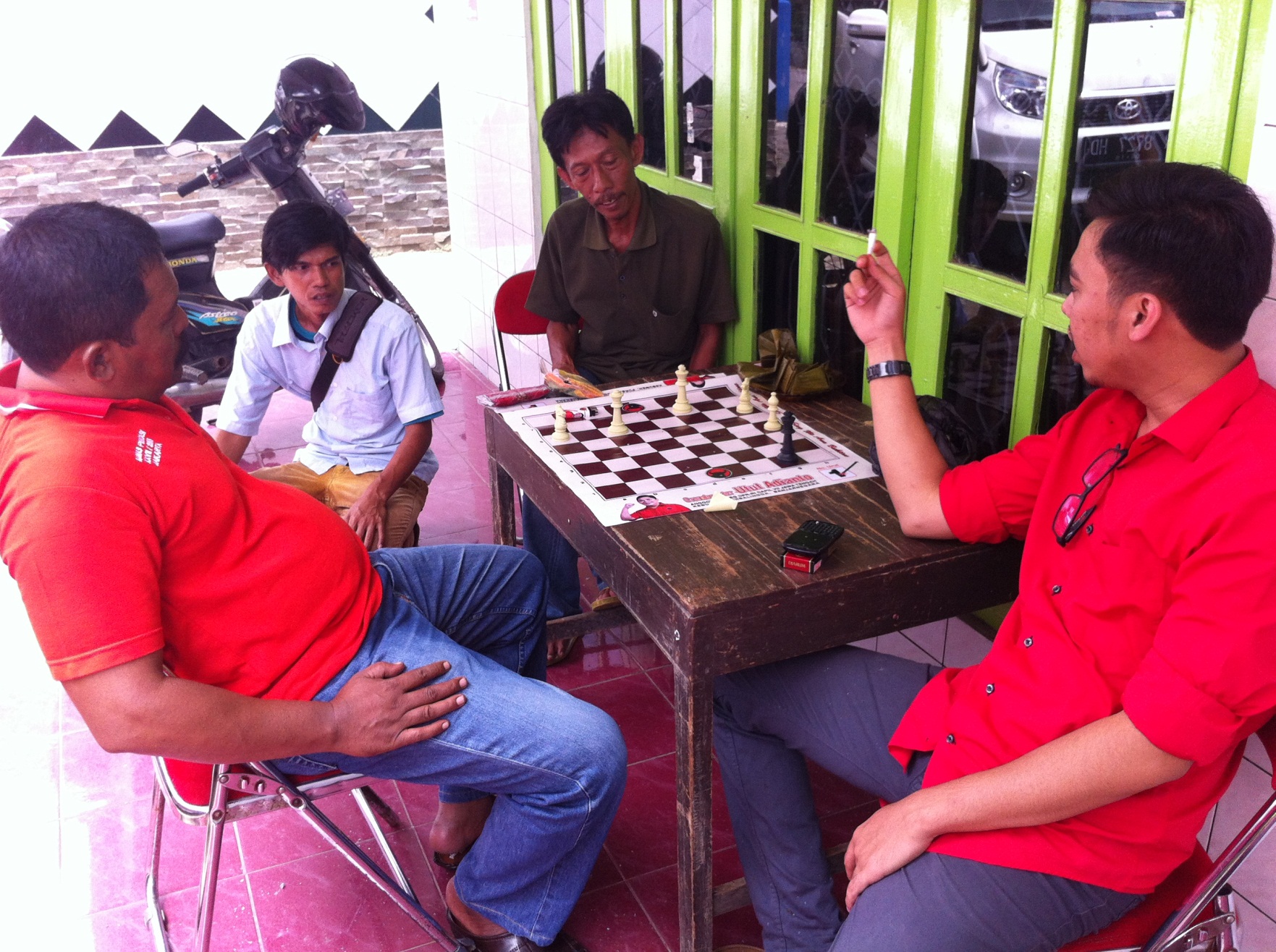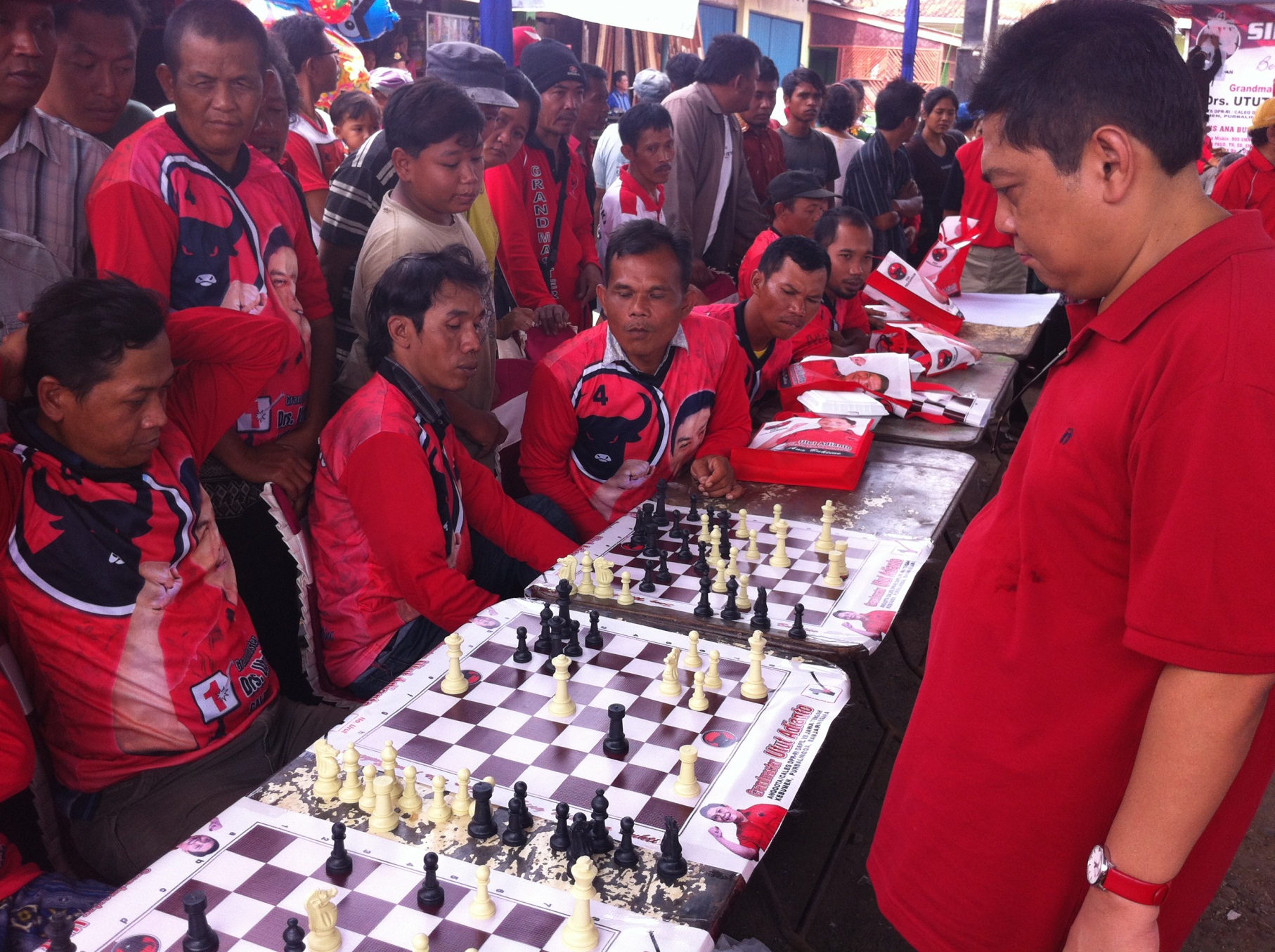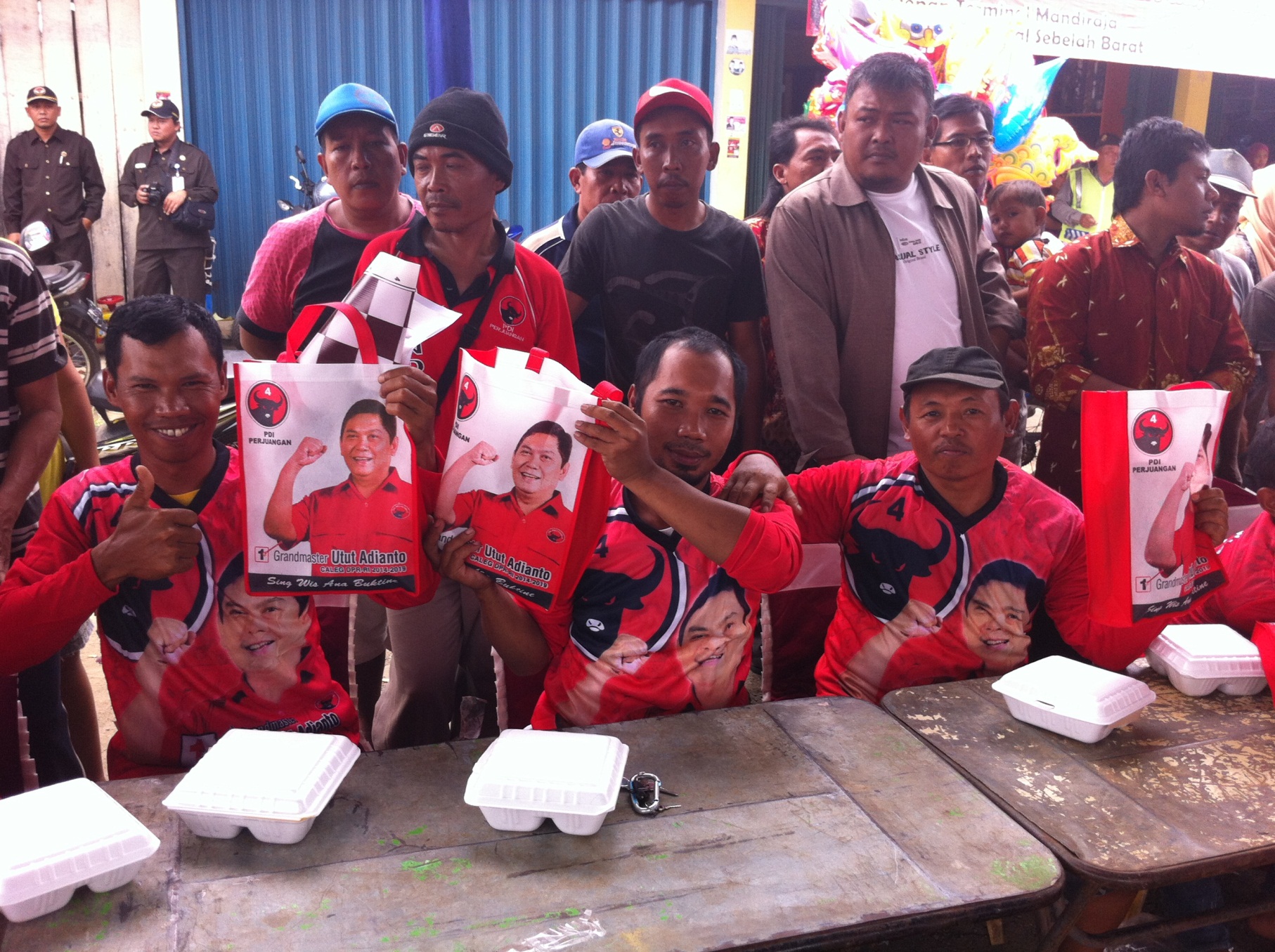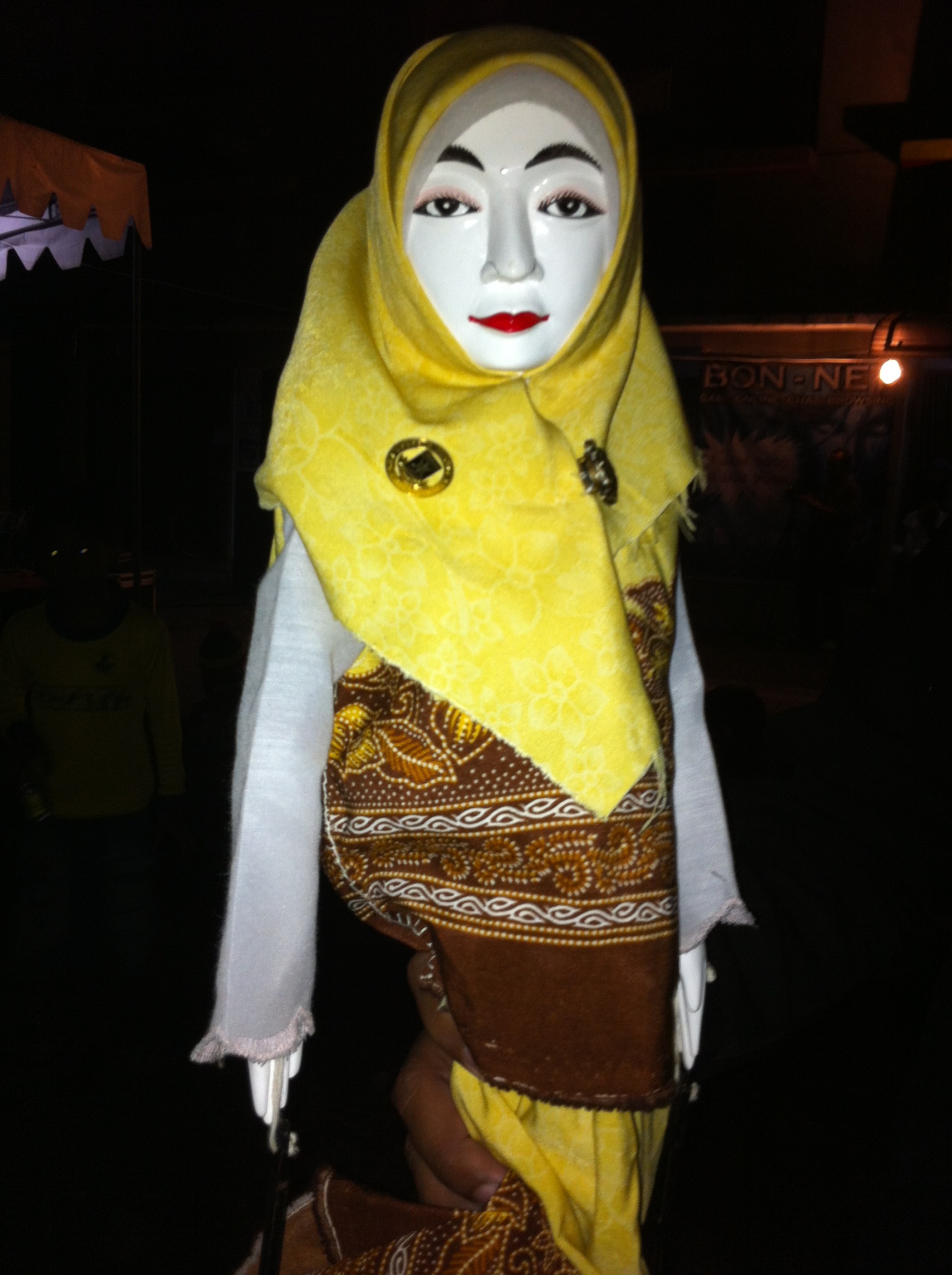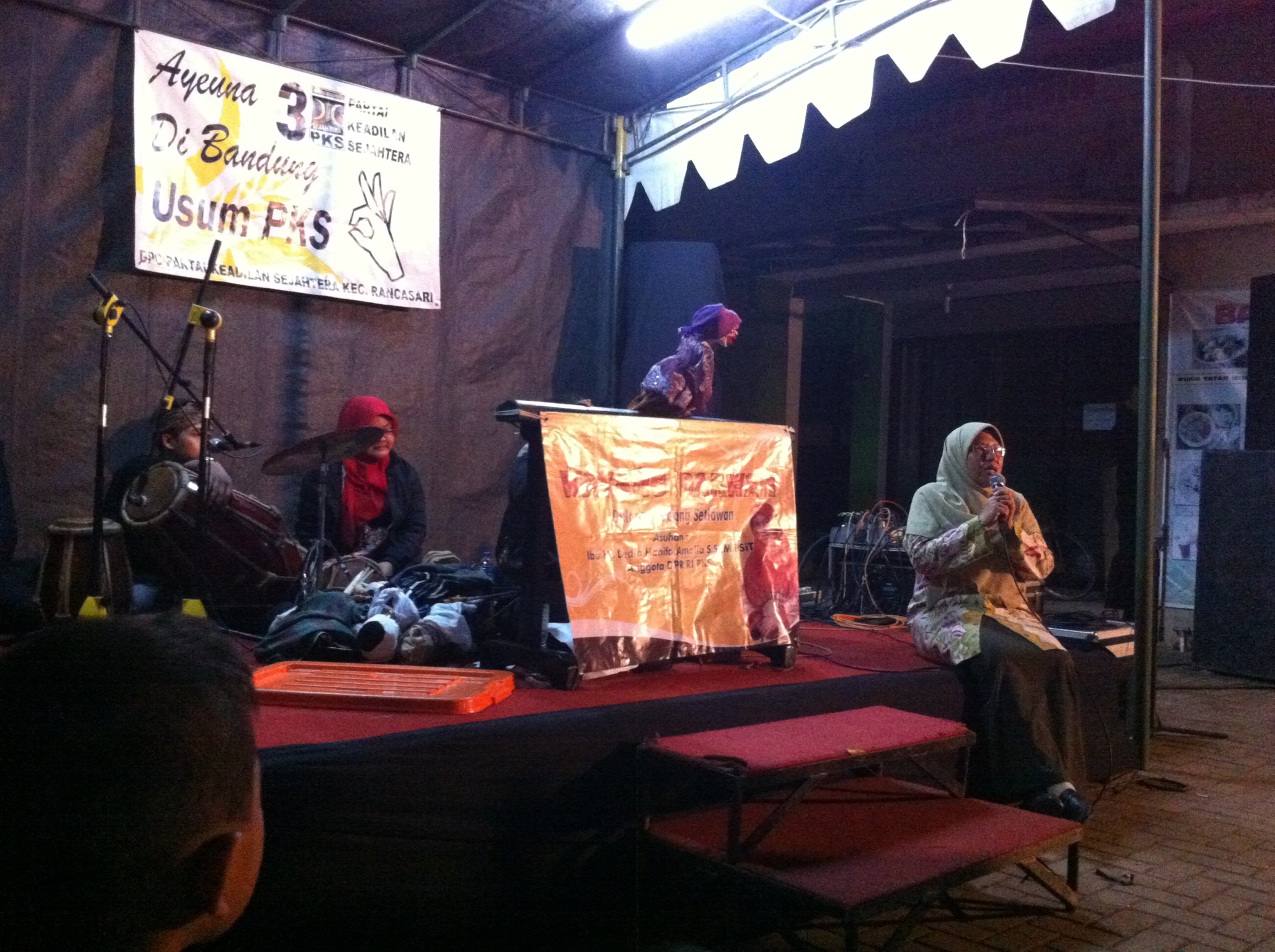While material inducements to voters have been prevalent in 2014, candidates also employ innovative campaign strategies to attract support
Tom Power
‘If you give voters money, it is not guaranteed they’ll vote for you. But if you don’t give them anything, you can guarantee that they won’t.’ Grandmaster Utut Adianto, a national parliamentarian from PDIP (Indonesian Democratic Party of Struggle) and Indonesia’s all-time top-ranking professional chess player, was articulating a common lament among the thousands of candidates who contested Indonesia’s 2014 legislative elections.
The emerging narrative of this year’s election campaign presents it as a chaotic, transaction-oriented affair, in which candidates vied to woo voters with mostly material inducements – ‘gifts’ of goods and food, pork-barrel promises of investment and community development, and outright bribery. In the weeks since polling day, several prominent politicians have condemned the materialism of contemporary electoral politics. Rieke Diah Pitaloka, a PDIP legislator and former West Java gubernatorial aspirant, decried rampant vote-buying in an angry post published on her website. Rieke’s party colleague Eva Kusuma Sundari, one of the highest-profile incumbents to lose her seat this year, blamed her defeat on avaricious constituents more responsive to bribes and ‘gifts’ from candidates than to the long-term commitment of dedicated representatives.
Yet while Utut acknowledged that money politics is now an almost universally accepted – indeed, expected – part of Indonesian elections, he was keen to emphasise that material inducements do not ensure electoral success. He explained: ‘Indonesian voters are not always ‘rational’; they won’t necessarily vote for you just because you offer them money or promise them development projects. Money is not enough. You need to differentiate yourself from your [electoral] rivals. You need voters to know you and admire you – then they’ll give you their support.’
There is logic to Utut’s argument: in an environment where candidate recognition rates are extremely low, and almost everyone is busy distributing material incentives to voters, political aspirants can gain advantage over their adversaries by establishing a unique ‘selling point’ which resonates within the electorate. While many candidates feel they can’t escape money politics and pork barrelling, those tactics also don’t negate the utility of more abstract, emotionally-oriented campaign strategies. Creative and distinctive forms of electioneering remain important tools for enhancing candidates’ popular appeal and – to borrow a common Indonesian phrase – ‘attracting sympathy’ (menarik simpati) from constituents.
The grandmaster and the puppetmaster
While travelling in Central and West Java during the lead-up to the 2014 election, I was fortunate to witness first-hand the creative campaign strategies adopted by two incumbent national parliamentarians: Hj. Ledia Hanifa Amaliah and Grandmaster Utut Adianto. Ledia, who stood in the mostly metropolitan seat of Bandung and Cimahi, incorporated the traditional wooden puppet shows (wayang golek) of her Sundanese constituency into her campaign events. Meanwhile, Utut utilised his chess mastery to pull crowds in his rural Central Java electorate, which encompasses the districts of Purbalingga, Banjarnegara and Kebumen and is a traditional stronghold of PDIP.
Chess paraphernalia was in evidence at each of Utut Adianto’s campaign coordination posts. Here Pak Gunawan, a member of the success team, and Utut’s parliamentary staffer Okida Samad (nephew of Corruption Eradication Commission chairman Abraham Samad) chat with Banjarnegara constituents across a chessboard - Tom Power
Ledia is among the most prominent female members of PKS (Prosperous Justice Party), an Islamic cadre party with a famously committed core constituency. Like the vast majority of PKS politicians, she has a background in the dakwah (Islamic predication) networks which developed on Indonesian campuses in the 1980s and 90s. As a parliamentarian she has focused mostly on social and community welfare issues, including women’s rights and child protection. Yet, like almost all of PKS’s best female candidates, Ledia was only offered the third slot on her party’s ballot paper (generally considered a disadvantage because many Indonesians automatically vote for higher-placed candidates).
Though he represents an electorate in Central Java, Utut was born and raised in Jakarta. Having achieved the title of Grandmaster aged just 21 (a Southeast Asian record at the time), he was a professional chess player through the 1990s and 2000s, and gained a degree of fame in a nation starved of sporting success. Prior to the 2009 elections, however, he joined Megawati Soekarnoputri’s PDIP and embarked on a political career. PDIP (somewhat fancifully) presents itself not only as the champion of Indonesia’s ‘ordinary folk’ (wong cilik), but also as the only political party still committed to the foundational ideals of the revolutionary state. Like many PDIP members, Utut describes himself as ‘abangan’ – a non-devout Muslim – and asserts that he is both a nationalist and a rationalist.
The personalisation of election campaigns
It was once the case that parties and their popular figureheads would provide the basis for building emotional bonds with constituents. Yet the open list system introduced following a 2009 Constitutional Court decision now encourages legislative hopefuls to compete with their party colleagues for seats. Indonesians can cast their votes for a party only, or they can vote ‘below the line’ and select their favoured candidate. The open list system allocates the legislative seats won by a party in each electorate according to its candidates’ personal vote tallies, rather than the order of their names on the ballot. In Indonesia’s multi-seat electorates, a candidate who has run for a seat-winning party must secure a higher personal vote tally than his or her party colleagues to take a seat in parliament.
As a result of this system, intra-party contestation for seats has become just as intense as traditional interparty rivalries. Indeed, in the words of scholar Edward Aspinall, the 2014 legislative elections saw ‘ground war style campaigns run by individual candidates’, in which ‘the major axis of competition [was often] between candidates from the same party, rather than different parties’. Ideational or emotional campaigns conducted along party lines no longer necessarily enhance candidates’ personal chances for election, meaning individual candidates have sought to develop more personalised strategies to distinguish them from their rivals (including those within their own party). That the national legislative result will deliver the most fragmented parliament in Indonesia’s history – all ten parties slated to enter the house won between 5 per cent and 19 per cent of the vote – is perhaps unsurprising given the candidate-orientated nature of the campaign.
Utut prepares his next move against a local player. Several defeated challengers and a sizeable crowd look on - Tom Power
Of course, a political environment in which parties are increasingly unable to exert influence over their candidates (beyond the nomination process) clearly threatens to undermine party solidarity. This problem has been of particular concern to PKS and PDIP, as two of Indonesia’s more internally cohesive parties. Both have maintained staunch opposition to the open list system on the grounds that it encourages internal disunity. When I asked PDIP’s West Java chairperson, Tubagus Hasanuddin, about recurrent stories of intra-party ‘black campaigns’ (semi-clandestine efforts by one individual to undermine another), he was quick to assert that any PDIP candidate he found to be involved in such activities would be severely punished. However, he also stressed that – for better or worse – the open ballot system had ensured that candidates’ own personalities, platforms and interests would be critical to the election outcome.
A grandmaster on the campaign trail
Despite retiring from international competition and venturing into national politics, Utut has maintained tightknit networks within the national chess-playing community. Not only does he hold senior executive office within the national chess association, Percasi, but he runs a chess school to train new generations of aspiring grandmasters.
Yet it was only while accompanying Utut and his ‘success team’ on the long car journey from Jakarta to Purbalingga that I came to appreciate the role that Utut’s chess fraternity plays in his current political career. The men I was travelling with were not professional campaign strategists, electoral brokers, or party functionaries – they were chess players. The surprising ethnic diversity of Utut’s team – which included men from Java, Aceh, Palembang, Makassar and Madura – made sense in the context of their common association with Percasi and their involvement in regional and national competition. Pak Junet, a brash Bugis, was in fact a former national champion, while Utut’s campaign manager, Pak Fahmi, had been a sparring partner for the grandmaster for more than two decades. Thanks to his standing within Indonesia’s chess fraternity and his familiarity with its membership, Utut had been able to call upon a trustworthy and committed group of lieutenants to assist with his re-election bid.
Some of Mandiraja’s resident chess masters display their prizes - Tom Power
Having left Jakarta after the commencement of the official campaign period, Utut missed the first day allocated to PDIP for open campaigning. Over the first few days we spent in the electorate, his re-election operation was conducted along largely ‘traditional’ lines, with a focus on gaining support from community leaders (tokoh masyarakat) who (it was hoped) would drum up support from the grassroots.
Immediately after arriving from Jakarta, Utut hosted the village head of Kutabawa – Pak Edy – at his Purbalingga ‘coordination post’ (‘posko’: really a small rental house). Utut and Edy engaged in a lengthy and rather indirect bargaining process: when Edy mentioned that a particularly active Gerindra Party candidate had recently campaigned in Kutabawa, Utut proclaimed his certainty that the villagers would remain ‘loyal’ to PDIP.
At a community meeting organised by Edy (who was ‘compensated’ for his brokerage) and attended by more than 60 men from Kutabawa and neighbouring villages, Utut mostly stuck to the party line. He first called upon the audience to help deliver the sizeable PDIP majority which would guarantee the success of PDIP’s newly-announced presidential candidate, Joko ‘Jokowi’ Widodo. He also emphasised that a PDIP government would introduce fertiliser and fuel subsidies to support farmers and fishers, the ‘little people’ that the party claims to represent. In terms of personal electioneering, Utut relied on circulating cigarettes, lighters bearing his picture, and envelopes of money (invariably referred to as ‘amplop’). He also claimed his position at the top of PDIP’s candidate list indicated he had the ‘trust’ of the party and Megawati herself.
‘Do you want to improve the lot of farmers…?’ Utut asked the attendees. ‘Do you want Jokowi to become president – a president who will improve the lot of all Indonesians…? If so, please give your support to PDIP.’
Utut used a similar strategy during his meetings with other community leaders, such as Kyai Ali Hanan, the principal of Banjarnegara’s oldest Islamic school, Pesantren Al Fatah. Utut explained the school community was sympathetic towards him because he had supported the construction of a library annex without demanding an unlawful kickback. While speaking with the kyai, he again linked support for PDIP in the legislative election with support for Jokowi’s candidacy, but offered little in the way of self-promotion.
Utut’s campaign slogan, ‘For Whom there’s Proof Already’ (in Javanese: Sing Wis Ana Buktine), indicated little more than his status as an incumbent: according to Utut’s local followers, he had very rarely visited his electorate. Utut’s failure to more clearly articulate why he should be chosen from among the seven candidates running on PDIP’s ticket seemed incongruous, given his anxiety over the competitive campaigns being run by Diah Defawanti Ande (PDIP’s second-placed candidate) and Irawati Hermawan (placed sixth). When I accompanied Utut’s Bugis friend, Pak Junet, into mountain villages near the Wonosobo border to gauge Utut’s advertising presence in the region, the greater visibility of Diah’s posters and flags proved cause for consternation.
Utut’s chess
Utut’s team arrived at the bus station in the small town of Mandiraja shortly after dawn. The night before, several members had erected a makeshift pavilion, and had arranged 20 tables and chairs beneath it in a horseshoe formation, facing a low stage. With the sun still low in the east, preparations continued apace: a sound system was checked, a huge Utut Adianto campaign poster was erected, chess mats were taped to the tables, and PDIP-branded bags of chess pieces were distributed.
Utut busied himself with an impromptu visit to the local market (Utut described this as ‘blusukan’ – the style of unannounced visit to constituents, to field questions and complaints, made famous by Jokowi – but a more accurate description here would be grassroots electioneering). Members of his success team, apparently augmented by ‘volunteers’ from the local party branch, distributed t-shirts adorned with Utut’s image and the PDIP logo. Dangdut rhythms pounded from the speakers beside the stage: in Indonesian towns, blaring dangdut is the most effective way to attract attention to an event. The tables were soon occupied by a motley assortment of locals eager to challenge the grandmaster; one early arrival, a burly, moustachioed man in a fake leather jacket, beat me three times while we waited for the crowd to swell. Throughout our contest he swayed to the music and sledged me with facetious complements on my chess prowess.
Eventually, after a brief introduction from the MC and a few words from Utut, the ‘simultaneous chess game’ (simultan catur) began: Utut pitted against 20 local ‘masters’. In this environment, Utut’s campaign came to life. He was no longer a vaguely familiar parliamentarian from Jakarta, who spoke minimal Javanese; he was the Grandmaster – someone to be known and admired. Though a few of the success team tried to encourage onlookers to ‘joget’ (dance) – a female dangdut singer had now occupied the stage – Utut himself was the absolute centre of attention, confidently circulating from table to table, one hand tucked behind his back; making quick, attacking moves; occasionally wiping sweat from his brow.
Utut defeated most of the local players within two dozen moves. At the conclusion of each game, he congratulated his opponent and signed the plastic chess mat; his staff packed the boards and chess pieces into a bag (again decorated with Utut’s photo), which was presented to the beaten challenger along with a lunchbox. No doubt these men would be keen to recount their experience of playing a grandmaster, and show off their Utut-branded souvenirs to their friends and families, potentially boosting Utut’s local support base. With Utut chasing at least 30,000 personal votes to see him returned, the few hundred he could earn from an event such as this would make it worthwhile.
With all but three contenders defeated, however, the dangdut music suddenly stopped. Two local campaign monitors (panwas), representatives of the Election Supervisory Board (Bawaslu) which was tasked with enforcing adherence to the prearranged national campaign schedule, took the stage to announce that the event had been deemed an illegitimate campaign activity. They ordered that Utut’s posters be taken down and (somewhat bizarrely) that the shirts he had distributed be worn inside-out; instructions which were followed immediately and without complaint. The monitors had, for uncertain reasons, waited until the event was in full swing before making their interruption.
Utut, who had hoped to bypass the schedule by framing the event as a chess demonstration, played out the remaining games without so much as glancing at the campaign monitors. As a token of humility, he offered a draw to the player he felt had performed most creditably: the same man who had routed me an hour earlier.
This was the first of a number of large-scale chess exhibitions held by Utut during his campaign, with the largest such event taking place in Kebumen on an official campaign day. Utut told me that his total expenditure over the campaign period was around Rp 3 billion (about $US300,000), or – he claimed – roughly his entire salary earnings over his five years in office. Among candidates running for national seats, this scale of personal outlay was fairly standard; Utut was not necessarily in a position to significantly outspend his rivals.
This was also an election at which a large number of incumbents were defeated, and (ostensibly) Utut had not been an especially diligent representative. Yet the ongoing real count suggests that Utut has been comfortably returned, despite PDIP losing one of the two seats it had held in his electorate. Of course, the primary business of campaigning for Utut remained material disbursement, patronage and brokerage; however, he also significantly benefitted from establishing, through chess, a point of differentiation which improved his name recognition and his local popularity.
Ledia’s likeness in puppet form - Tom Power
Ledia’s puppetry
Utut is by no means the only candidate to have turned to creative campaign strategies in an effort to improve ballot box outcomes. Prior to my departure for Indonesia, Ledia Hanifa Amaliah told me that she was conducting community events in Bandung which she referred to as Wayang Ledia (‘Ledia’s Puppetry’), and suggested that I should attend one of these shows. According a source close to PKS’s West Java leadership, Ledia was among the most frugal incumbent campaigners in 2014, spending only around Rp.1 billion ($US100,000) on her re-election bid. Unable to match the expenditure of more cashed-up opponents, she turned to public displays of traditional Sundanese puppetry (wayang golek) as one method of raising her profile and delivering constituent appeal.
The use of traditional puppetry, an art form which has its roots in pre-Islamic culture, to deliver political or social messages is not uncommon within Indonesia’s largest Islamic body, Nahdlatul Ulama. It is not, however, a practice readily associated with the more puritanical PKS. Yet Ledia comes from a well-connected Sundanese family with a keen awareness of West Java’s cultural heritage, while her party presented a moderate, ‘catch-all’ image during this year’s election campaign. In this context, Ledia’s use of wayang golek, while innovative, was not altogether surprising.
Besides conducting puppet shows in a range of locations throughout her electorate, Ledia distributed 200,000 letters, detailing her achievements to Bandung households. She employed local youths to deliver these letters, and confirmed that they had reached their destinations by including a number of contactable PKS members on the mailing list. The structure of her success team was quite unlike Utut’s; rather than utilising personal networks and employing brokers to distribute material inducements, Ledia worked alongside party cadres and focused on building personal rapport with voters.
One day on the campaign trail, having just participated in a seminar on female political participation at the Bandung Islamic University, Ledia travelled to the suburb of Rancasari in the east of the city, where a new PKS branch office was being opened. Occasions like this, she explained, provide ideal opportunities for her puppetry displays. Relative to other parties, PKS – at least in Bandung – seemed internally solid throughout the campaign. Not only did party cadres, rather than paid ‘volunteers’, carry out much of the support work required by candidates, Ledia told me that the candidates themselves sought to maintain amicable relationships and improve the efficiency of the party machine by conducting their official campaign activities within agreed-upon geographical boundaries. Indeed, Ledia claimed that the PKS candidates in her electorate were running BlackBerry messenger groups to share information and offer mutual support, suggesting a commonality of purpose which was lacking among Utut’s PDIP colleagues.
By the time we reached Rancasari, a crowd had gathered in anticipation of Ledia’s puppetry display. As the evening progressed, more than 200 local residents turned out to watch; for the most part, these were not the young, educated Muslims who comprise PKS’s traditional core constituents, but lower-middle class families – including plenty of women and children – from the surrounding neighbourhood.
The puppet show itself was conducted by a group of artists from Bandung, and was presented exclusively in the Sundanese language. It told the story of a female voter who is trying to decide who to support at election time. She is first approached by a male PKS cadre, who explains that his party fields committed candidates like Ledia, conducts community welfare programs, and is responsive to constituents in a way other parties aren’t. The voter dismisses him, however, as a holier-than-thou chump. She is next visited by a drunk, lazy, money-dispersing wretch, who is running for office with a different party, but is clearly inept and dishonest. After a lengthy comedic exchange – which seemed to resonate with the crowd – the voter sends him packing. The cadre then returns, much to the relief of the voter, who promises to support PKS.
If the first part of the show was party-focused, the second half was oriented towards Ledia’s own candidacy. It opened with a song: ‘Bu Ledia, she can do it, Bu Ledia, she can do it,’ followed by the new PKS slogan, ‘Love, Work, Harmony’. A new character, known only as ‘teteh’ (big sister), was then introduced, who proceeded to interview, first, a Ledia lookalike puppet voiced by the parliamentarian, and then Ledia in person.
Ledia did not use her time on stage to conduct open electioneering, however. Rather, she spent the next 40 minutes or so answering questions posed by ‘teteh’, mostly relating to issues of community interest. She discussed at length the Family Empowerment and Welfare program (PKK), access to health and education facilities, family planning services, and a range of related topics. Though PKS’s ‘clean and caring’ image was severely tarnished following the trial and imprisonment, on corruption charges, of its former president Luthfi Hasan Ishaaq, members like Ledia have seemingly managed to preserve the honest and community-minded approach to politics that the party once stood for.
Ledia answers a question about family welfare posed by ‘teteh’ - Tom Power
Following the show, Ledia expressed her disappointment that the evening’s performance was not as entertaining as it could have been: ‘usually we can combine ‘socialisation’ (sosialisasi) [of Ledia’s candidacy] and humour more effectively… and get the audience more involved’. Yet by orienting her campaign activities towards issues that actually affect the day-to-day lives of her constituents, adopting a distinctive communicative medium, and making use of her party’s grass roots presence, Ledia has remained a highly competitive candidate despite apparently rejecting ‘money politics’ altogether. With the count in her electorate still underway at the time of writing, Ledia is reportedly neck-and-neck with Arif Minardi in the race to secure PKS’s sole seat.
The value of innovative campaigning
There is no doubt that ‘money politics’, in its various forms, was enormously influential in the 2014 legislative election. However, the campaigns of Grandmaster Utut Adianto and Hj. Ledia Hanifa Amaliah show it would be wrong to conclude that electoral outcomes in Indonesia are only determined by material distribution and brokerage networks. Many Indonesian voters remain responsive to other methods of campaigning which aim to build emotional bonds between representatives and constituents, and enhance name recognition at the ballot box. Utut and Ledia show there is almost no limit to the creativity that candidates can employ when trying to boost their chances.
Tom Power (thomas.power@anu.edu.au) is a PhD student at the Australian National University.
